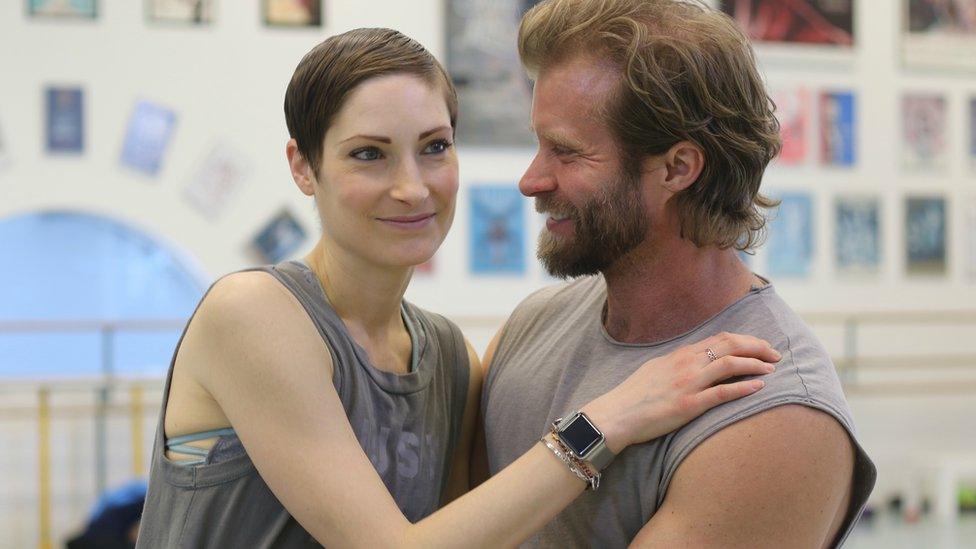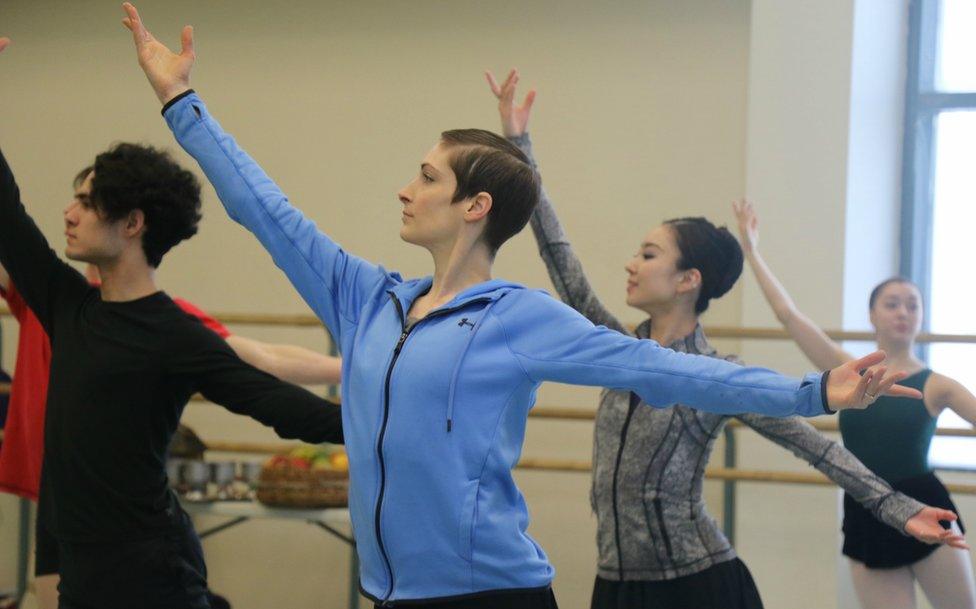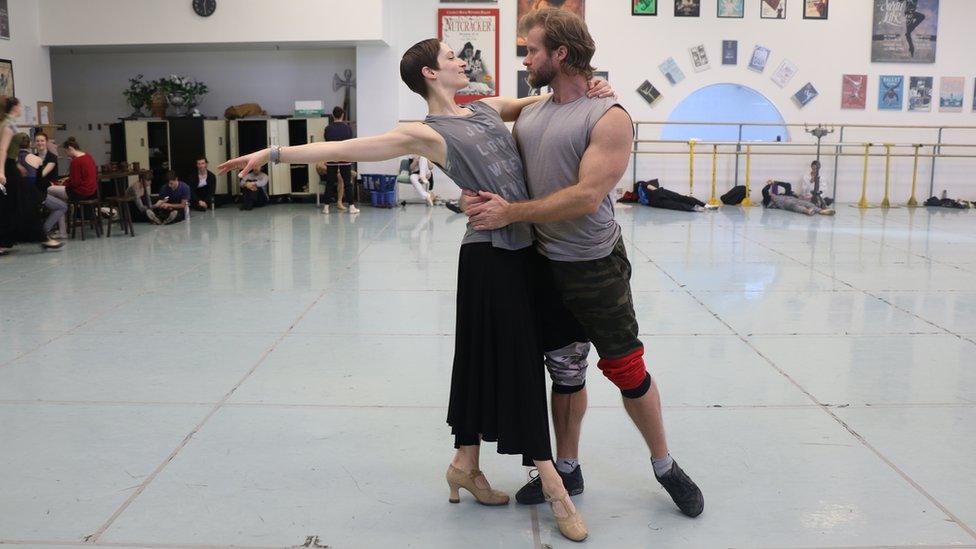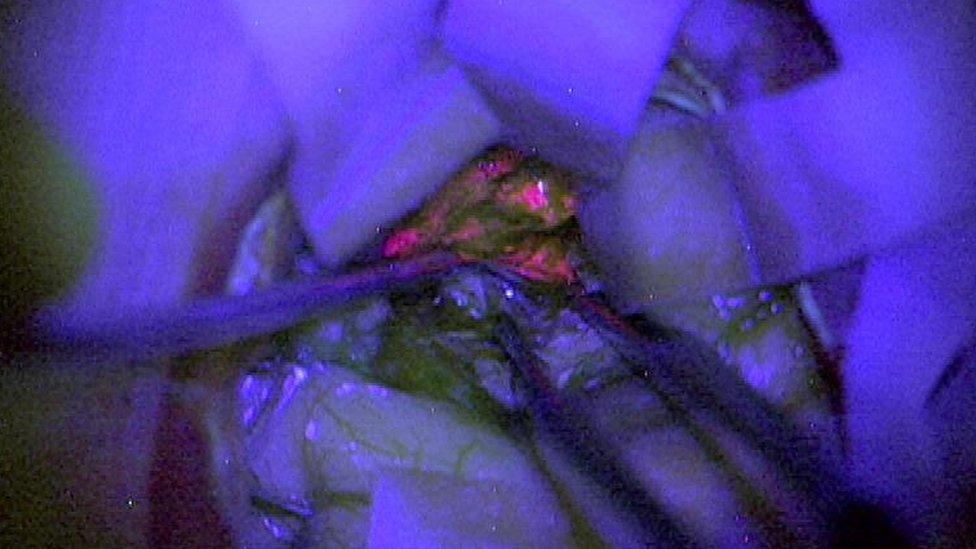Catherine Wreford: The dancer with an 'invisible disease'
- Published

Catherine Wreford and Craig Ramsay will play Lady and Lord Capulet in Romeo and Juliet
You could easily go and see Catherine Wreford perform in a show and not know anything was wrong.
A professional dancer with a huge number of stage credits to her name, it's perhaps only when you look at the show programme that you'd find out she has brain cancer.
"I always put it in my bio because I want people to know I'm on stage and still performing, but I have an invisible disease," she tells BBC News.
"And I want people to know the invisible disease I have will kill me at some point, but not now. I can still dance, and because I can still dance, that's what I'm doing."
When the 39-year-old was first diagnosed with anaplastic astrocytoma (a malignant brain tumour), she was told she had between two and six years left to live.
That was six years ago.
But despite 2019 being the year that her determined time should be up, she is preparing to appear in a new production of Romeo and Juliet in her Canadian home city.

Catherine Wreford and Craig Ramsay, pictured in 2005
The Royal Winnipeg Ballet (RWB) has invited her back, along with her close friend Craig Ramsay, two decades after the pair trained at the company's ballet school.
Together, she and Craig will portray Lord and Lady Capulet when the production opens on 13 February.
"Rehearsals have been going really well, everyone is so kind and accepting of us," Wreford says of the last few weeks.
Tara Birtwhistle, associate artistic director of the RWB, says she's "thrilled" to have Wreford and Ramsay back.
"We are proud of all that they have accomplished and to have them here, performing with the company, rehearsing in the studios where they learned their craft, is incredibly emotional, even more so in context of Catherine's story," she tells BBC News.
Despite training as a dancer and going on to star in Broadway shows, Wreford had actually given up her career in the entertainment industry more than a decade ago.

Wreford said the whole company had been "kind and accepting" of her during rehearsals
"I'd gone from training to performing on Broadway, and I'd never taken a break," she explains. "I was doing one show while rehearsing for another show, and my body was breaking down, I had a bunch of injuries.
"So I thought I'd take a little time off, and that turned into many years off, and I ended up running a mortgage company and then becoming a nurse."
Such a career change might sound like a total departure from her performing background - but Wreford surprisingly found plenty of overlap between dancing and being a mortgage advisor.
"It's basically the same thing, I'm acting right?!" she laughs. "I choreograph people into getting a new mortgage!... so I got to use that part of my brain a lot."

Symptoms of a malignant brain tumour

Headaches (often worse in the morning and when coughing or straining)
Fits (seizures)
Regularly feeling sick or vomiting
Memory problems or changes in personality
Weakness, vision problems or speech problems that get worse
The outlook for a malignant brain tumour depends on things like where it is in the brain, its size, and what grade it is.
It can sometimes be cured if caught early, but a brain tumour often comes back and it sometimes isn't possible to remove it.

After several successful years running the mortgage company, Wreford decided to train as a nurse.
But just as she was focused on graduating and giving birth to her second child, tragedy struck.
"I graduated from nursing school on 10 May [2013], had my daughter Quinn on 18 May, and was diagnosed with brain cancer on 24 June."
But after her diagnosis, Wreford says she decided she wanted to spend her final years going "back to what I really love, which is being on stage and performing".
A determination to continue performing is common among entertainers with such conditions.

John Newman and Russell Watson were both diagnosed with benign (non-cancerous) brain tumours
Chart-topping singer John Newman, who is 28, had to take a break when he was first diagnosed with a benign brain tumour in 2012, which returned in 2016.
But he kept ambitions high, continuing to write music and commenting that he was aiming to play Wembley Stadium, external this year.
"I've got this thing in my head. It's part of my body and I have other things I need to concentrate on," he told The Sun, external.
Similarly, opera singer Russell Watson said he used it as inspiration, and is set to embark on a 22-night tour later this year.
"As soon as I was told it was physiologically improbable that I would go back to performing the way I was before... I thought, 'I'll show you!'" he told Jeremy Vine in December, external.
"All I need is someone to tell me I can't do something. It was painful but I feel very lucky every time I walk on stage."
For Wreford, the part of her brain most heavily affected relates to her short term memory and speech.
Which presumably means that, when it comes to performing, learning a dance is easier than dialogue.
"Absolutely," she says. "Dancing is way easier for me than learning lines and songs.
"I'm proud of myself if I can get through an audition without messing up the lines. But choreography still sticks in my head, that's a different part of my brain."

Wreford tells directors and producers of her condition in advance, who make allowances for her needs.
"When I play a bigger role, the people who hire me know the situation and send me everything way ahead of time so I can sing it and learn the lines three times a day, so it moves more from my short term memory to my long term memory," she explains.
"I don't have much of a short term memory, so Craig will be like, remember this thing we learned yesterday, and I'll be like nope, no memory of it at all!"
Speaking about how her diagnosis has impacted her attitude, Wreford says: "My perspective has completely changed.
"I think I'm better off now than I was when I was diagnosed, in terms of my attitude about appreciation of my life, the friends and family I have in my life, not taking them for granted, just being kind and loving everybody around me."
Wreford feels strongly that she and her two children, eight-year-old Elliot and five-year-old Quinn, talk openly about her condition - which can sometimes result in finding humour in the situation.
"I treat them like adults," she says, "while still being parental".
"Elliot once came with me to the oncologist, and he was seven at the time. And I said, 'Hey buddy do you wanna ask any questions?'
"And," she laughs, "he asked the oncologist, 'How much money do you make?' And I was like, 'Not those kinds of questions!'"

Follow us on Facebook, external, on Twitter @BBCNewsEnts, external, or on Instagram at bbcnewsents, external. If you have a story suggestion email entertainment.news@bbc.co.uk, external.
- Published4 November 2018
